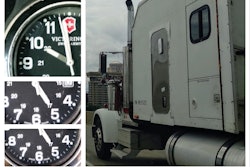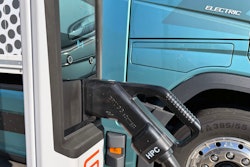Earlier this month, the Owner-Operator Independent Drivers Association (OOIDA) filed an opening brief in its appeal against California’s AB 5 independent contractor law that effectively bans the traditional leased owner-operator model in the state.
A California district court judge in March ruled against the trucking industry in its effort to halt the state’s application of the restrictive AB 5 independent contractor law on trucking, ultimately ruling that truckers should make their case legislatively rather than judicially.
In the weeks following, OOIDA and the California Trucking Association filed appeals in the Ninth Circuit Court of Appeals, challenging the district court judge’s decision. CTA has since decided not to continue its legal challenge of the law, however.
"The California Trucking Association has litigated AB 5 for four and a half years and have decided not to pursue further appeal of the District Court's latest decision," said CTA CEO Eric Sauer. "While we strongly believe that the Court's initial finding of preemption was correct, California and the legislation’s union sponsors had to take the position that the state's 70,000 owner-operators had a right to conduct business in the state in order to overcome our arguments. This is a win for the working class entrepreneurs that make up the backbone of the state's supply chain."

OOIDA, on the other hand, said it would continue to fight the law it believes harms owner-operators across the nation.
“We will continue with the case in order to fight for our members from all states who want to conduct business in California,” said OOIDA President Todd Spencer. “Since 2019, we have opposed California’s efforts to destroy the owner-operator, and we won’t stop now.”
In its opening brief filed Aug. 5, OOIDA said the law’s ABC test for determining worker classification -- particularly the “B” prong that requires a worker perform work that is outside the normal course of the hiring entity’s business – “effectively prohibits an entire sector of small business truckers from operating in California.”
“Because leased owner-operators’ work is within motor carriers’ usual course of business -- moving freight by truck -- they cannot work as independent contractors for motor carriers under the ABC test,” OOIDA contended.
[Related: Trucking loses latest attempt to block California's AB 5]
The group added that it’s not just limited to drivers who live in California, but extends to all leased owner-operators who work in California, regardless of where they’re from or how much time they spend in the state.
OOIDA argued that “AB 5’s blanket prohibition of leased owner-operators constitutes an unreasonable burden on interstate commerce in violation of the dormant Commerce Clause of the U.S. Constitution.”
The group added that neither the state, nor the International Brotherhood of Teamsters (an intervenor on the state’s behalf in the case), “made any showing that AB 5 is in any way better at addressing truck driver misclassification than the standard it replaced,” adding that the defendants “introduced no evidence that California derives any benefit from the application of AB 5 to out-of-state truckers” who pick up and deliver freight in the state.
OOIDA also argued that the law violations the dormant Commerce Clause because it discriminates against interstate commerce. The group noted that the law provides for a “Business-to-Business” exemption that truck drivers can use, but OOIDA argued that the federal “Truth-in-Leasing” rules don’t allow for it.
[Related: Are leased owner-operators really 'independent contractors'?]
The B2B exemption would require, in part, that the owner-operator “is free from the control and direction of the contracting business.” The Truth-in-Leasing rules that apply to interstate truckers require that motor carriers have “exclusive possession, control and use” of and “complete responsibility for the operation of” the leased owner-operator’s truck.
As such, the motor carrier control required by federal law prohibits a leased owner-operator from being “free from control or direction,” as required by the B2B exemption, OOIDA said.
“The availability of the B2B exemption to California-based intrastate truckers but not interstate truckers not only discriminates against interstate commerce, but it also violates the Equal Protection Clause,” the group added. “For a law adopted for the purpose of classifying California workers under the ABC test, there is no rational basis for the California legislature to provide an exemption for local intrastate -- but not interstate -- truckers.”
In appealing to the Ninth District Court, OOIDA asked that the court hold that AB 5 violates the dormant Commerce Clause as unreasonably burdensome, and that the court invalidate the requirements of the B2B exemption that conflict with the federal leasing rules “as unconstitutional discrimination against interstate commerce and a violation of leased owner-operators’ constitutional rights to equal protection under the law.”
OOIDA noted that its challenge is not directed at intrastate drivers who live and work exclusively in the state and who operate as in drayage businesses servicing the ports and other intermodal operations.
[Related: CTA, OOIDA file appeal against latest AB 5 ruling]











